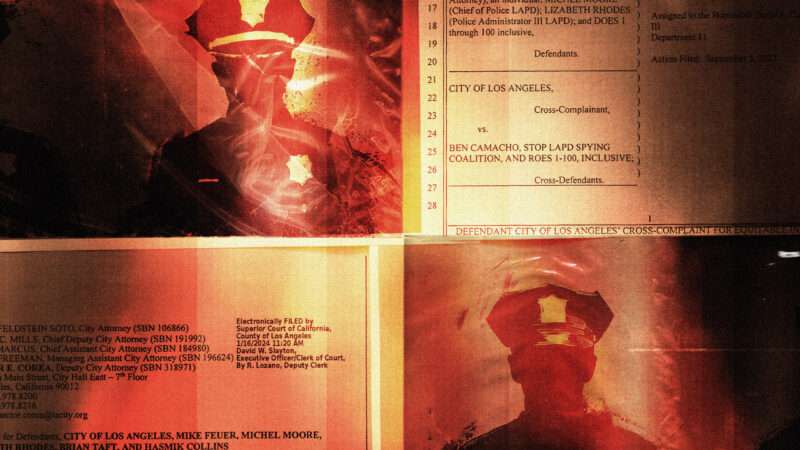Los Angeles Undermines Freedom of Information In Suit Over Police Photos

In 2022, the City of Los Angeles Office of the City Attorney settled a public records lawsuit filed by Ben Camacho, a local journalist, under the California Public Records Act. That law grants members of the public access to government records upon request. Camacho had requested headshots of all the Los Angeles Police Department's (LAPD) officers. He was investigating the LAPD after officers allegedly refused to identify themselves to the public in many instances.
"It's all about accountability and transparency," says Camacho. "Nothing more, nothing less."
The city attorney's office denied Camacho's initial request, but after he sued over their refusal, it eventually provided him with a flash drive of the police photos in September 2022. Those photos were then published by the Stop LAPD Spying Coalition (SLSC) on its website Watch the Watchers.
Now, two years later, Camacho and the SLSC are both being sued by the city attorney's office, which claims it provided the police photos in error.
Last March, the LAPD's labor union, the Los Angeles Police Protective League (LAPPL), filed the first in a series of lawsuits related to the publication of the police photos. LAPPL's suit against the city demanded that the city take legal action "to prevent further public disclosure of the undercover officers' photographs" because the photos provided to Camacho allegedly include undercover officers. (LAPPL's communications agency did not respond to a request for comment.)
In response to being sued by the police labor union, the city attorney's office filed its first lawsuit against Camacho and the SLSC last April. The city's suit alleges that, although it objected to providing photos of undercover officers, it nevertheless "inadvertently" did so. For redress, the city's suit demands the return of the original flash drive provided to Camacho, the destruction of all physical and electronic copies of the police photos, and an injunction preventing Camacho and the SLSC from further distributing the photos. (Citing pending litigation, the L.A. City Attorney's Deputy Director of Communications, Ivor Pine, declined to comment.)
"The city's allegations are nothing but a regret put into a legal complaint," says Camacho.
Although the city attorney's office repeatedly describes its handing over the police photos as "inadvertent," Camacho rejects that characterization. The LAPD routinely publishes rosters of its officers by name. Thus "when faced with the decision of which photos to redact, the city and LAPD had to make a choice," says Camacho. "Do they redact certain officers, despite their names being on the roster they had already released, thus identifying them [as undercover]? Or release all of the photos pertaining to the roster and then claim it was an accident? They chose the latter, which opened the door to make me a scapegoat."
Last September, hundreds of unnamed LAPD officers filed two lawsuits against the LAPD and the city for negligence, invasion of privacy, breach of contract, and legal malpractice for providing the police photos to Camacho. The officers' suit claims that the publication of the photos creates "a clear and direct threat to all officers," especially those allegedly undercover. Their suits thus seek damages to compensate for emotional distress, protection, and relocation.
With the city now being sued twice over this, the city attorney's office decided to sue Camacho and the SLSC twice, filing another lawsuit in January that attempted to shift the blame in the officers' suit to them. According to this suit, because the city only "inadvertently-produced" the police photos, while Camacho and SLSC knowingly published them, the city should not only be indemnified, but entitled to seek damages from the citizen journalists to cover any settlement with the officers.
The LAPPL and the city both claim they want to have the police photos taken down. Yet "the city's censorship efforts just drew more attention to the matter and provoked more people to share and re-publish the records," according to Shakeer Rahman, the SLSC's attorney. "So the records are now everywhere and there is no way they can be censored, even if we take our website down tomorrow."
As Rahman sees it, L.A. City Attorney Hydee Feldstein Soto's real goal is not preventing the spread of the photos but making Camacho and the SLSC pay for her office's blunders. Camacho, who describes himself as a "working class, freelance journalist of color," insists he could not possibly ever pay "for what could be millions of dollars in damages" and is relying on pro bono legal counsel and fundraising to avoid being on the hook for the city's choice to give him those public records.
"These cases should never have been filed and are a disgrace," Rahman says. "But the city attorney has every incentive to keep using the legal system for stunts like this, because she's backed by the city's massive treasury and will do anything she can to coddle the police force and their powerful union."
The post Los Angeles Undermines Freedom of Information In Suit Over Police Photos appeared first on Reason.com.
